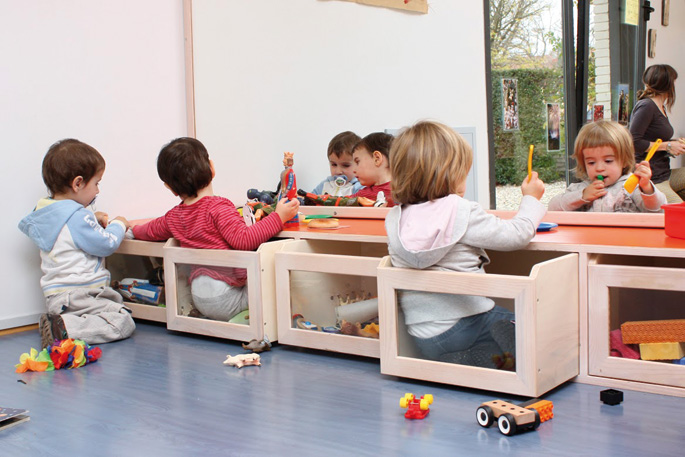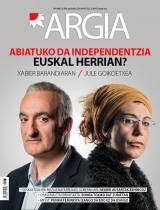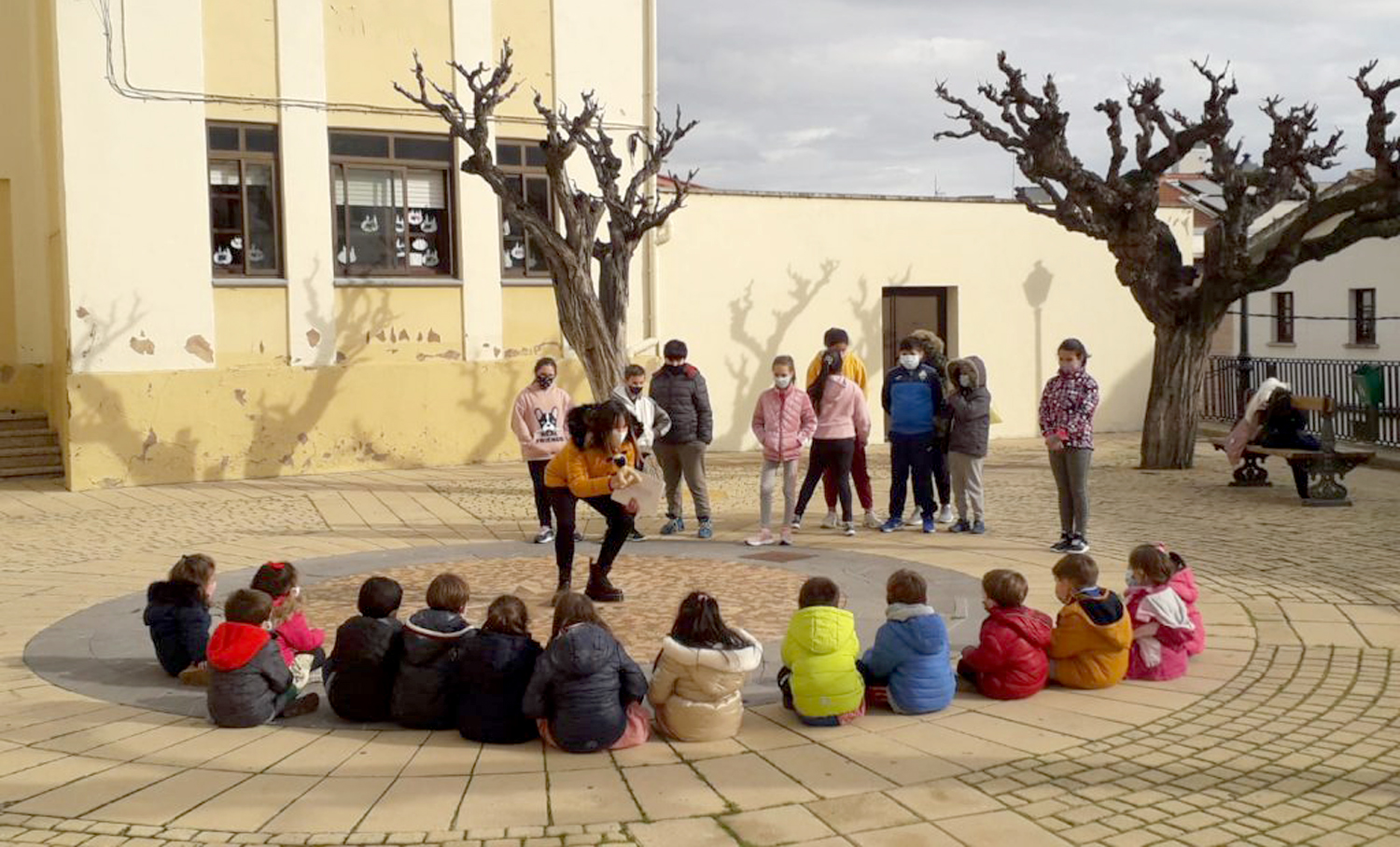Boosting citizen and participatory schools
- The association for the New Basque Public School Sortzen is 25 years old this year and in addition to the annual festival – which this year is celebrated in Hernani under the slogan EskolHarria biharko herria – they have organized several activities over the months. We’ve been at the round table with schoolchildren and participants, listening to Mariam Bilbatua, former HUHEZI teacher and Gari Torregrosa, director of the Izartegi children’s school in Iruñea.

The first to take the floor was Mariam Bilbatua. In their opinion, the participatory school gives a twofold dimension to education: the dimension of learning and the dimension of collaboration. “It is social strategies that allow us to live; we grow and educate in interaction with the other, and so we build our learning process and develop our competencies.”
He also says that the human being must develop two types of understanding: intellectual understanding and human understanding. Intellectual understanding is the knowledge of the environment; human understanding is the understanding of the other, empathy with the problems of others. “These things are not learned by themselves and the development of these characteristics is part of the educational challenges.”
Learning
The key to involving students and faculty in the learning process is to rely on learning, for example, by working in cooperative groups. In the words of Bilbatua, this increases the identity, autonomy and commitment of students. Teamwork, however, does not guarantee the participation of all students: the principles of learning are to implement learning processes related to emotions, share objectives constructed and negotiated in groups and feel essential for all the people who compose it.
In addition to students, the objective should be to achieve the integration of teachers. Teachers should reflect on the processes that have been put in place and teachers should create a group identity: “They have to feel part of a challenge and the responsibility for this challenge must be the team, not the individual.”
Putting in place learning processes related to emotions, with shared objectives built and negotiated in groups and with the feeling that all the people in the group are essential, are the principles of learning
He adds that laws such as Heziberri and LOMCE increase teacher dependence and that top-down models do not achieve teacher involvement: “We need professional learning communities to address these models.” These communities focus on debate and reflection and have a common language for sharing knowledge: “They place the community within the same model of analysis of things.” Team commitment is the basis and each professional feels the need of his/her partner, enabling everyone to participate and from mutual trust. Community creation requires institutional support: “Teachers need stable work, with opportunities and conditions to develop learning communities.” The confidence of the Administration is also important: “The administration promotes a system of bureaucratic controls that does not contribute to the development of such projects.”
Educational community = formal, informal and non-formal education
Non-formal education (leisure, media...) influences the education and development of students. The former teacher explains that school communities must develop from this awareness, and to do so it is necessary to create educational networks: “Social, political and cultural actors and the educational community need common objectives.” In this way, the reflection of the agents involved in formal, informal and non-formal education should be encouraged: “We must ensure the participation of all actors and develop mechanisms to enable it.” In his view, the projects being implemented must be socialised and evaluated.
Izartegi de Pamplona, towards the participative school
“Families and educators together create the project and we all have the same goal: the well-being of the child.” These are words of Gari Torregrosa, director of the Izartegi children's school in Pamplona/Iruña. The children's school was launched in 1976, driven by the demand of the popular movement. In 1995 he had difficult times, but thanks to the struggle of parents and educators, they managed to keep him from closing.
The educational center of the Chantrea district welcomes children between 0 and 3 years old who have been renovated in 2006. They use a wide range of methodologies and are based on an idea: “The child is a trained person.” They work active listening with both children and families, trying to adapt to their needs. They offer children spaces to get many emotions and sensations, and they decide what to work for: “We give them freedom to experiment.” For this, they have a companion “next door”, neither before nor after.
The participation of families is encouraged and in the meetings held throughout the course, mechanisms are established to make them comfortable, “because families have to take care of them”. In everyday life, parents enter to look for their children, a sign of transparency and trust. There are also areas for family members in the centre: “Fathers and mothers can spend two hours with their sons and daughters in the afternoon, and that is what we take advantage of to clarify doubts or doubts.”
Contacts are also being developed with neighbourhood associations, including primary and secondary schools. A traineeship programme has been launched in which students from these schools have conducted traineeships at the children's school. They have also been visited by musical groups in the neighborhood or by storytellers, among others.
At the end of the round table, a professor spoke in the public who summarised the general discussion well: “The members of the community must believe that it is possible: to explore ideas and paths, to make effort, to gather together and to wager among all.”
"We want to learn Basque! Respect linguistic rights!" Under the motto, convened by the unions LAB, STEILAS and ELA, and with the support of Ernai NUP, Euskal Herrian Euskaraz, HE Gurasoak, Observatory of Linguistic Rights, Ikama, Euskera Group of the UPNA and Sortzen have held a... [+]
How many equal (or very similar) festivals have we met in recent years in Euskal Herria? Maybe we would tell them by name, but how many macro-parties have we seen in one village and another in the face of the program and the organization? It will be the evidence that we had more... [+]
Milaka lagun elkartu dira Sortzen elkarteak antolaturiko D ereduaren aldeko festan. Urte osoan egindako lana ospatzera Iruñera hurbildu diren pertsonei eskerrak eman dizkiete antolatzaileek eta Sortzen hezkuntzaren burujabetza lortzeko sortu zela gogorarazi dute.
Maiatzaren 21ean Iruñean ospatuko duten jaiaren etekin ekonomikoaren parte bat Nafarroako zonalde diskriminatuan dauden D ereduko lerro berriak laguntzeko bideratuko dute, Haizea egitasmoarekin.






















